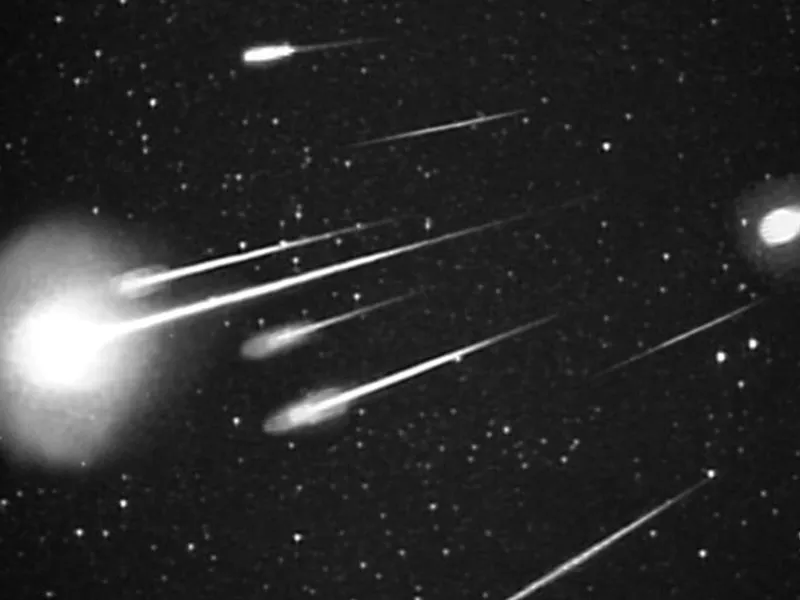
A burst of 1999 Leonid meteors as seen at 38,000 feet from Leonid Multi Instrument Aircraft Campaign (Leonid MAC) with 50 mm camera.
Credit: NASA/Ames Research Center/ISAS/Shinsuke Abe and Hajime Yano
It's like fishing finding out what you catch.
Göbekli Tepe and the Prophecy of Pillar 43 | Apocalypse and the Vulture Stone by The Why Files, 2.85M subscribers
NASA page: https://science.nasa.gov/solar-system/m ... :body_type
Leonids Meteor Shower peak during mid-November each year & are considered to be a major shower.
Comet of Origin: 55P/Tempel-Tuttle
Radiant: Constellation Leo
Active: Nov. 3 to Dec. 2, 2023 (Peak Nov. 18)
Peak Activity Meteor Count: about 15 meteors per hour
Meteor Velocity: 44 miles (71 kilometers) per second
The Leonids, which peak during mid-November each year, are considered to be a major shower though meteor rates are often as low as about 15 meteors per hour. The Leonids are bright meteors and can also be colorful. They are also fast: Leonids travel at speeds of 44 miles (71 kilometers) per second, and they are considered to be some of the fastest meteors. Every 33 years, or so, viewers on Earth may experience a Leonid storm that can peak with hundreds to thousands of meteors seen per hour depending on the location of the observer.
A meteor storm versus a shower is defined as having at least 1,000 meteors per hour. Viewers in 1966 experienced a spectacular Leonid storm: thousands of meteors per minute fell through Earth's atmosphere during a 15-minute period. There were so many meteors seen that they appeared to fall like rain. The last Leonid meteor storm took place in 2002.
Leonids are also known for their fireballs and Earth-grazer meteors. Fireballs are larger explosions of light and color that can persist longer than an average meteor streak. This is due to the fact that fireballs originate from larger particles of cometary material. Fireballs are also brighter, with magnitudes brighter than -3. Earth-grazers are meteors that streak close to the horizon and are known for their long and colorful tails.
Viewing Tips
The Leonids are best viewed starting at about midnight local time. Find an area well away from the city or street lights. Come prepared for winter temperatures with a sleeping bag, blanket, or lawn chair. Orient yourself with your feet toward the east, lie flat on your back, and look up, taking in as much of the sky as possible. In less than 30 minutes in the dark, your eyes will adapt and you will begin to see meteors. Be patient – the show will last until dawn, so you have plenty of time to catch a glimpse.
Where Do Meteors Come From?
Meteors come from leftover comet particles and bits from broken asteroids. When comets come around the Sun, the dust they emit gradually spreads into a dusty trail around their orbits. Every year the Earth passes through these debris trails, which allows the bits to collide with our atmosphere where they disintegrate to create fiery and colorful streaks in the sky.
The pieces of space debris that interact with our atmosphere to create the Leonids originate from comet 55P/Tempel-Tuttle. It takes comet Tempel-Tuttle 33 years to orbit the sun once. Comet Tempel-Tuttle was discovered twice independently – in 1865 and 1866 by Ernst Tempel and Horace Tuttle, respectively. Tempel-Tuttle is a small comet – its nucleus measures only about 2.24 miles (3.6 kilometers) across.
The Radiant: You should not look only to the constellation of Leo to view the Leonids – they are visible across the night sky. It is actually better to view the Leonids away from the radiant: They will appear longer and more spectacular from this perspective. If you do look directly at the radiant, you will find that the meteors will be short – this is an effect of perspective called foreshorte.
https://science.nasa.gov/solar-system/m ... s/leonids/